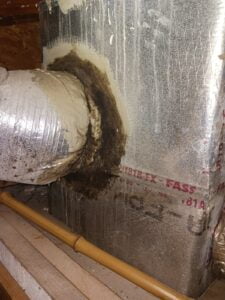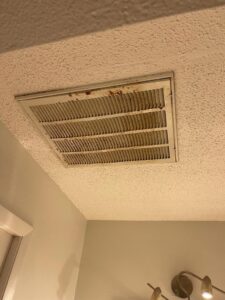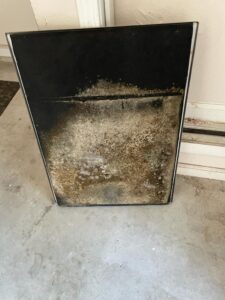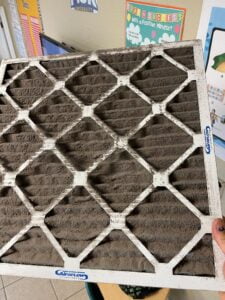Bad AC Smell: Discover 6 Causes and How to Fix Them
The sweet relief of walking into a cool room on a hot summer day is one of the little joys of life. But what happens when you’re greeted not by a fresh breeze but by a foul odor emanating from your air conditioning (AC) unit? A bad AC smell can turn your comfortable home into a smelly nightmare, making it unbearable to stay indoors.
While a bad AC smell is a common problem, it’s not something you should ignore. It could indicate a serious issue that might worsen over time, jeopardizing the performance of your unit and, in some cases, your health. In this blog, we will explore six common causes of a bad AC smell and provide guidance on how to fix them.
An air conditioning (AC) unit is undoubtedly one of the greatest modern comforts. It cools down your home on hot days, helps control humidity levels, and generally makes your living environment more comfortable. However, even this marvel of modern technology is not immune to problems. One issue that homeowners frequently encounter is the problem of a bad AC smell.
The issue of a bad AC smell is not only unpleasant but can also be a sign of a more significant problem that can jeopardize your unit’s performance and, in some cases, your health. The first and often most common cause of bad AC smells we explore is dirty and clogged air filters. These filters trap airborne particles to circulate clean air throughout your home.
This blog post offers readers comprehensive insights into the causes behind bad AC smells, how to fix them, and importantly, how to prevent them. Remember, while a bad AC smell is a nuisance, it is also a symptom of a potential issue that you should not ignore. Regular maintenance and prompt action at the first sign of trouble can ensure the smooth operation of your AC unit and the overall comfort of your home.
Common Causes of Bad AC Smells: Why does my AC have a weird smell?
Mold and Mildew Growth
- Understanding how moisture fosters mold and mildew in AC systems.
- Identifying the signs of mold and mildew presence in the HVAC unit.
Clogged Air Filters
- The impact of dirty air filters on air quality and odor emission.
- Proper maintenance and regular replacement to prevent bad smells.
Dirty Evaporator Coils
- How accumulated dirt and grime on coils lead to bad smells.
- Cleaning methods and preventive measures to keep coils odor-free.
Blocked Condensate Drain Line
- Exploring the consequences of a clogged drain line.
- Clearing the blockage and avoiding future issues.
Refrigerant Leaks
- Uncovering the dangers of refrigerant leaks and their odor.
- Professional repair procedures for fixing refrigerant leaks.
Dead Animals or Pests
- How small animals or pests can find their way into the HVAC system.
- Safely removing the carcass and preventing future intrusions.

Identifying the Smell: What Does It Mean?
Musty and Moldy Odors:
Musty smells are often indicative of mold or mildew growth in your AC system or ductwork. Mold and mildew thrive in moist environments, and if your system has excessive moisture buildup, it can create a breeding ground for these microorganisms. Proper ventilation and using a dehumidifier can also help prevent mold and ensure clean air circulation.
Musty and moldy odors are common indicators of a bad AC smell, usually signaling the presence of mold or mildew within your AC system. This scenario typically arises when excess moisture accumulates in the unit, creating an ideal environment for mold and mildew to thrive. Not only is this odor unpleasant, but it can also have adverse health effects, such as triggering allergies and respiratory issues.
Furthermore, if left untreated, this bad AC smell can signify that your system’s efficiency is deteriorating, leading to increased energy usage and a reduced lifespan for your unit. Therefore, it’s crucial to address these musty and moldy odors as soon as they arise, ensuring your AC system functions optimally and maintains the indoor air quality of your home.
Burning or Chemical Odors:
When your AC is running, if you detect burning or chemical-like smells, it may suggest a bad AC smell arising from electrical issues within the system. Electrical components, such as wiring or motors, can overheat or become damaged, emitting an alarming odor and leading to potential fire hazards. This bad AC smell should not be ignored. When experiencing such odors, it’s vital to turn off your AC system immediately and avoid using it until a qualified HVAC technician inspects and rectifies the problem. Addressing electrical issues promptly not only ensures your safety but also prevents further damage to the AC system and eliminates the bad AC smell.
Rotten Egg or Sulphur Odors:
A rotten egg or sulfur-like smell in your home can be alarming as it may indicate a gas leak. Natural gas, which has a distinctive smell of rotten eggs, is added to the gas supply for safety reasons. If you detect this smell, it’s crucial to act quickly. Leave your home immediately and avoid using electrical switches or creating sparks, as they could ignite any accumulated gas. Once outside and at a safe distance, contact your gas company and emergency services to address the gas leak. Gas leaks are extremely hazardous, and professional intervention is necessary to resolve the issue safely.
Bad AC Smell requires a systematic approach to identify and resolve the root causes behind these unpleasant odors. When faced with a bad AC smell, it’s crucial to take proactive measures for a comfortable and healthy indoor environment. Start by checking and changing the air filters regularly, as clogged filters can contribute to bad smells.
Professional HVAC technicians are equipped with the expertise and tools to tackle complex problems related to bad AC smell effectively. By understanding the various factors that can cause bad odors, homeowners can implement preventive measures and ensure their air conditioning system operates optimally, delivering fresh and clean air throughout their homes.
Effective Solutions for Smelly AC
DIY Maintenance Tips:
Regular maintenance is essential to prevent bad smells from developing in your AC system. Two key DIY tasks you can perform are cleaning air filters and evaporator coils. Begin by locating the air filter, typically found near the air handler or return air vent. Check the filter for dirt and debris, and if it’s dirty, replace it with a new one or clean it if it’s reusable. Clean air filters allow for better airflow and reduce the risk of bad odors.
Keeping your air conditioning unit well-maintained is a proactive way to avoid a bad AC smell. DIY maintenance can go a long way in preserving the efficiency and freshness of your AC system. One of the simplest yet most effective steps you can take is regularly cleaning or replacing your unit’s filters, which can otherwise trap dust and particles that lead to unpleasant odors. Checking the drain pan for any stagnant water and clearing it can also prevent musty smells.
Additionally, inspecting the ductwork for any mold or mildew can save you from enduring a persistently bad AC smell. Remember to keep the outdoor unit clean and unobstructed to ensure good ventilation. Lastly, using a mild, non-abrasive cleaning solution for the AC’s exterior parts can keep them free from grime and odor-causing bacteria. While these DIY tips can help, don’t hesitate to call a professional if you detect a persistent bad smell, as it may indicate a more serious underlying issue.
Professional HVAC Inspection and Cleaning:
When a persistent bad AC smell permeates your home, it might be time to consider a professional HVAC inspection and cleaning. While DIY maintenance can address minor issues, certain problems require the expertise of a trained technician. Issues such as refrigerant leaks, electrical faults, or severe mold and mildew infestation are best left to professionals. A comprehensive HVAC inspection can identify the root cause of the bad smell, ensuring all components of the system are in optimal condition.
Furthermore, professional cleaning can effectively remove deep-seated grime, mold, and bacterial growth that may contribute to the unpleasant odor. Regular professional servicing not only alleviates the bad AC smell but also extends the life of your unit, enhances energy efficiency and ensures your indoor air quality remains high. Always remember, when it comes to maintaining a fresh and comfortable home environment, professional HVAC services are an investment, not an expense.
They can identify potential issues before they worsen and provide thorough cleaning to remove dirt and contaminants that DIY methods might miss. Professional HVAC maintenance includes cleaning components like the blower motor, evaporator, and condenser coils, and inspecting the ductwork for leaks or blockages. By investing in regular professional maintenance, you can ensure your AC system operates optimally, improving indoor air quality and minimizing the risk of bad odors.
Preventive Measures:
To prevent bad smells from recurring, implement preventive measures in your HVAC maintenance routine. Regularly inspect your system for signs of mold or mildew growth and address any issues promptly. Keep the area around the outdoor unit clear of debris and maintain proper airflow.
In addition, focus on indoor air quality by keeping your home clean, well-ventilated, and free from pollutants. Using air purifiers and controlling humidity can also help reduce the risk of bad odors.
By combining DIY maintenance, professional HVAC inspections, and preventive measures, you can enjoy a fresh and pleasant indoor environment free from unwanted odors. Prioritize regular care for your AC system, and you’ll reap the rewards of improved air quality and comfort.
What are the air quality enhancements?
Air Purifiers and Ionizers:
Air purifiers and ionizers are effective tools for eliminating bad odors and improving indoor air quality. Air purifiers work by capturing and trapping airborne particles, including odor-causing molecules, using filters. On the other hand, ionizers release negative ions that attach to pollutants, causing them to fall to the ground and out of the air. Both technologies can help reduce the presence of bad smells in your home.
When considering an air purifier or ionizer, choosing the right device for your specific needs, home size, and budget is essential. Some models are designed to target specific pollutants, while others offer broader purification capabilities.
Humidity Control:
Humidity levels play a crucial role in indoor air quality and can impact the presence of bad smells. High humidity creates a favorable environment for mold and mildew growth, which can lead to musty odors in your home. To tackle this issue, investing in a dehumidifier can be beneficial.

HVAC Ductwork and Bad Smell
Dirty or Contaminated Ducts: Accumulated dirt, dust, and debris in the ductwork can contribute to bad AC smell in the air circulated throughout your home. Over time, dust and contaminants can build up in the ducts, creating an environment that promotes unpleasant odors. These odors can then be distributed into different rooms whenever the AC system is running, affecting indoor air quality.
To mitigate this issue, regular duct cleaning is essential. Professional duct cleaning involves the thorough removal of dust, debris, and other contaminants from the ductwork. By having your ducts cleaned on a regular basis, you can reduce the risk of bad odors and improve the overall indoor air quality in your home.
Leaky Ducts: Leaks in the ductwork can cause several problems, including drawing in unwanted odors from unconditioned spaces like the attic or crawlspace. The air circulating through the ducts can pick up odors from these areas and transport them into the living spaces of your home.
Properly sealing the ducts is crucial to prevent outside odors from entering the living areas. A professional HVAC technician can inspect the ductwork for leaks and seal them effectively. This not only helps to keep bad smells at bay but also improves the efficiency of your AC system by ensuring that conditioned air reaches its intended destination without leaks or wastage.
Maintaining clean and sealed ductwork is vital in addressing bad AC smell. Regular duct cleaning and proper sealing of leaks can significantly contribute to a fresher and more pleasant indoor environment, free from unwanted odors. Consulting a professional HVAC technician for duct-related issues can ensure that your air conditioning system operates efficiently and delivers clean, odor-free air throughout your home.
Biological Growth in Ducts
Bacteria and Fungi:
Bacterial or fungal growth within the ducts can be a source of unpleasant smells that are dispersed when the AC system is running. Ductwork can provide a dark and humid environment conducive to the growth of microorganisms, and if left unchecked, these bacteria and fungi can thrive and emit foul odors. In addition to causing bad smells, they may also contribute to poor indoor air quality and potential health issues.
Professional HVAC contractors can address this issue by using specialized treatments to eliminate bacteria and fungi. Duct cleaning and disinfection procedures are employed to ensure that the ductwork is free from harmful microorganisms, leading to fresher and cleaner air circulation throughout your home.
Viruses and Airborne Pathogens:
While relatively rare, in some instances, viruses or other airborne pathogens can find their way into the ducts, potentially leading to unpleasant odors when the AC is running. This occurrence is more common in cases of homes with compromised ventilation systems or in areas with a high concentration of airborne pathogens.
To reduce the risk of pathogens in the air, proper air filtration and ventilation are crucial. High-quality air filters can capture many airborne particles, including viruses and bacteria, improving indoor air quality. Furthermore, ensuring that the ventilation system is functioning correctly and providing adequate fresh air exchange can help minimize the presence of pathogens in the ducts.
Overall, addressing issues related to bacteria, fungi, and pathogens in the ducts requires the expertise of HVAC professionals. By utilizing specialized treatments and ensuring proper air filtration and ventilation, homeowners can create a healthier indoor environment and alleviate any bad smells associated with these microorganisms.

Chemical VOCs and Odors
Off-Gassing from Building Materials: Some new construction materials, furniture, or household products can release volatile organic compounds (VOCs) that cause unpleasant odors. VOCs are emitted as gases from certain solids or liquids, and they can be found in various household items, such as paints, adhesives, carpets, and furniture.
When these materials are new or recently installed, they may off-gas, releasing these VOCs into the air. As a result, you may notice a distinct chemical-like smell in your indoor environment. Prolonged exposure to high levels of VOCs can lead to health issues such as headaches, eye irritation, and respiratory problems.
Adequate Ventilation and Low-VOC Products: To reduce the impact of off-gassing from building materials, proper ventilation is essential. Ensuring that your home is well-ventilated allows for better airflow and helps disperse VOCs, minimizing their concentration in indoor air.
Additionally, when choosing new construction materials, furniture, or household products, opt for low-VOC or VOC-free alternatives. Many manufacturers now produce eco-friendly, low-VOC products that emit fewer harmful chemicals into the air. Look for products labeled as “low-VOC” or “VOC-free” to create a healthier indoor environment with reduced odor issues.
DIY Solutions and Safety Precautions
DIY Cleaning and Maintenance: While some minor bad AC smells can be resolved through DIY cleaning, it’s essential to exercise caution and follow safety guidelines. Regularly changing air filters, cleaning visible parts of the AC unit (such as the outer casing), and clearing debris around the outdoor unit can help prevent some odor issues. However, for more complex issues, it is best to consult a professional HVAC contractor who has the knowledge and expertise to handle the situation effectively and safely.
If unsure about bad AC smell and handling certain issues, such as cleaning evaporator coils or inspecting ductwork, it’s better to err on the side of caution and seek professional help. Attempting intricate maintenance tasks without the necessary expertise can lead to further problems or even damage to the AC system.

Safety Concerns and Gas Leaks: If you suspect a gas leak, safety should be the top priority. Immediately leave your home and go to a safe location outside the premises. Do not operate any electrical switches or use any open flames (including lighting matches or cigarettes) while in the vicinity of the suspected leak. Contact the gas company and emergency services as soon as possible to handle the situation.
In summary, while some DIY cleaning and maintenance can be helpful for minor issues, safety should always come first. For any doubts about handling a Bad AC smell or gas-related concerns, consult a professional HVAC contractor promptly to ensure the well-being of your household and the proper functioning of your air conditioning system.
Fresh Air Awaits: Troubleshooting Bad AC Smells with The AC Therapist!
To conclude, managing bad AC smells effectively requires an understanding of their causes, solutions, and preventative measures. As this blog has shown, whether it’s dirty filters, mold growth, stagnant water, refrigerant leaks, electrical issues, or unwanted critters, each cause has its unique fix.
At The AC Therapist, we understand that dealing with these issues can be challenging for homeowners. Our experienced team of HVAC professionals is ready to help you restore the comfort of your home, from diagnosing bad AC smells to implementing efficient solutions. We’re committed to ensuring your AC system is operating at its best, providing cool, fresh air without any unpleasant odors.
Never let bad AC smells ruin your home’s comfort. Contact The AC Therapist today, your trusted local HVAC contractor in the Tampa Bay area, and breathe easy in your fresh and comfortable home.









